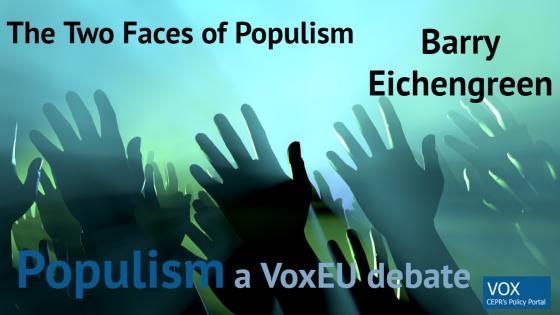This column is a lead commentary in the VoxEU debate on "Populism"
I’ve written about populism before (Eichengreen 2018), including for Vox (Eichengreen et al. 2017). In my contribution to this Vox debate, I revisit that work in light of recent events and subsequent scholarship.
To start at the start, I define populism as a political movement with anti-elite, authoritarian, and nativist tendencies. Since populist movements combine these tendencies in different ways, there are different variants of the phenomenon: left-wing populism, which emphasises the anti-elite element; and right-wing populism, which emphasises hostility towards foreigners and minorities.
Explanations are typically framed as a contest between culture and economics (Rodrik 2019). The economic argument is straightforward: poor economic performance feeds dissatisfaction with the status quo. It fosters support for populist alternatives when that poor performance occurs on the watch of mainstream parties. Rising inequality augments the ranks of the left behind, fanning dissatisfaction with economic management. Declining social mobility and a dearth of alternatives reinforce the sense of hopelessness and exclusion.
The alternative is that populism is less about economics than culture and identity. It is about the challenge to the majority from racial, religious, and ethnic minorities. It is a protest against the declining influence of the once-dominant group. It is a reaction to the challenge posed by immigrants and minorities to the people as a homogeneous entity.
But identity politics, racial politics, and cultural politics are not new; they have long histories in the US and other countries. Simply saying that the US has a history of racial division and of hostility toward immigrants doesn’t tell us why these themes are now resonating so powerfully. Similarly, simply observing that Britons have always been suspicious of Europe can’t explain why Brexit resonated so much powerfully in 2016 than in the first referendum on UK membership in the European Community in 1975.
Here I am attracted by the argument of Pippa Norris and Ronald Inglehart in their book, Cultural Backlash (Norris and Inglehart 2019). Norris and Inglehart argue that the swing in public opinion is generational. In the US, younger generations are richer, better educated, and more secure than their parents. They embrace ‘post-materialist’ values of secularism, autonomy, and diversity at the expanse of religiosity, traditional family structures, and conformity. This leaves earlier generations feeling alienated, rendering them ‘strangers in their own land’. And those older voters disproportionately go to the polls.
One can make a similar argument about Brexit. Today’s young have grown up flying around Europe on Ryanair and dealing with Italian baristas, French au pairs, and Polish hairdressers. They are better educated than their elders. Their educations have been shaped by the Bologna process. Hence, they are more likely to identify as European. Again, their more Eurosceptical parents are left feeling like ‘strangers in their own land’, or in this case like ‘strangers in Europe’.
Over time, the older ‘materialist’ generation will die out. In the US, its members will become dominated numerically by younger, better educated generations who value diversity. In the UK, they will be dominated numerically by younger, better educated generations who value Europe rather than dismissing it. Strong predictions about the future have been based on such logic. According to one study of the UK electorate by YouGov, with each passing day the Leave majority shrinks by 1,356 votes (Wired 2019). This arithmetic suggests that Remain moved into the lead last 19th January.
This of course is wrong. YouGov assumes that people’s opinions are immutably molded when they’re young. What this misses is that people also grow more conservative and, in the UK case, Euroscepitcal as they age. Psychological studies conclude that individuals as they age grow more closed-minded and less cognitively flexible. In addition, older people are more likely to acquire property and live on fixed incomes, rendering them more risk averse and more concerned about loss of control.
This observation suggests that as today’s young continue to age, some will shift from supporting Remain to supporting Leave. And since longer lifetimes and low birth rates are causing the British electorate to grow older, the implications for public opinion are precisely the opposite of those that flow from the cohort-based interpretation.
How important these ageing and cohort effects are relative to one another is an empirical question. Fortunately, courtesy of the British Election Study we have responses to questions about UK membership in the EU going back to the 1970s. This survey has been taken around the time of every General Election and at the times of the two EU membership referenda, yielding more than 100,000 individual responses. My co-authors and I matched up the answers with information on when each respondent was born and his or her age at the time surveyed (Eichengreen et al. 2018).
But other conditions also vary from year to year and, therefore, from survey to survey. Moreover, if I tell you when a survey was taken and the age of a respondent, you can immediately calculate when that individual was born. For the technically inclined, age, cohort and year or time effects are perfectly correlated. In order to estimate any two, you have to make a further assumption about the third.
One can solve this problem in a variety of ways. Simplest is to substitute current economic conditions for the year when the survey was taken. When you do so, you learn two things. First, the age and cohort effects are both there. They work in opposite directions, as predicted. As the earliest cohorts die off, anti-EU sentiment wanes. But as the UK population ages, it grows more Eurosceptical. The two effects roughly cancel out.
What doesn’t cancel out, and what in fact produces sharp swings in public opinion year to year, is current economic conditions. Our estimates suggest that economic grievances tipped the balance in 2016. Slightly faster productivity growth, slightly less inequality or slightly greater economic security would have been enough to produce a different outcome. The overwhelming importance of economic conditions is true of the referendum. So, we’re back to where we started: populism and Brexit are as much about economics as they are about culture and identity.
At one level, this is reassuring. If authoritarian, xenophobic populism is rooted in cultural, identity concerns, then it is not clear how to address it. If, on the other hand, it is rooted in economics, then we know how to address it – in principle anyway. Namely, with policies that enhance socioeconomic mobility, that reduce income disparities, that increase economic security, and that help left-behind places. I argue in my book that we know a lot about such policies, from early childhood education and progressive education to universal access to health care. The question is whether we possess the political and social cohesion needed to implement them.
References
Eichengreen, B (2018), The Populist Temptation: Economic Grievance and Political Reaction in the Modern Era, Oxford University Press.
Eichengreen, B, M Haines, M Jaremski and D Leblang (2017), “Populists at the polls: Economic factors in the 1896 presidential election”, VoxEU.org, 25 October.
Eichengreen, B, R Mari, G Thwaites (2018), “The future of pro-EU sentiment in the UK”, VoxEU.org, 5 November.
Norris, P and R Inglehart (2019), Cultural Backlash: Trump, Brexit, and Authoritarian Populism, Cambridge University Press.
Rodrik, D (2019), “What’s Driving Populism?”, Project Syndicate, 9 July.
Wired (2019), “Remain would win a second Brexit referendum. Why? Blame death”, 28 February.



